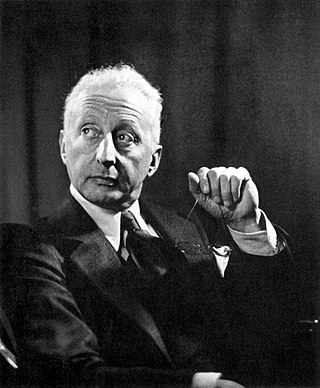
Jerome David Kern was an American composer of musical theatre and popular music. One of the most important American theatre composers of the early 20th century, he wrote more than 700 songs, used in over 100 stage works, including such classics as "Ol' Man River", "Can't Help Lovin' Dat Man", "A Fine Romance", "Smoke Gets in Your Eyes", "The Song Is You", "All the Things You Are", "The Way You Look Tonight" and "Long Ago ". He collaborated with many of the leading librettists and lyricists of his era, including George Grossmith Jr., Guy Bolton, P. G. Wodehouse, Otto Harbach, Oscar Hammerstein II, Dorothy Fields, Johnny Mercer, Ira Gershwin and Yip Harburg.
This is a list of notable events in music that took place in the year 1913.
This is a list of notable events in music that took place in the year 1908.
This is a list of notable events in music that took place in the year 1907.

Jean Schwartz was a Hungarian-born Jewish American composer and pianist. He is best known for his work writing the scores for more than 30 Broadway musicals, and for his creation of more than 1,000 popular songs with the lyricist William Jerome. Schwartz and Jerome also performed together on the vaudeville stage in the United States; sometimes in collaboration with Maude Nugent, Jerome's wife, and the Dolly Sisters. Schwartz was married to Jenny Dolly from 1913 to 1921.
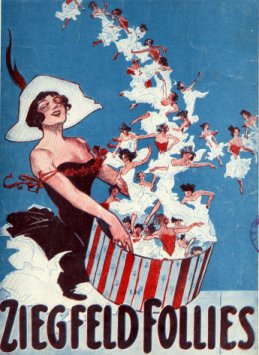
The Ziegfeld Follies were a series of elaborate theatrical revue productions on Broadway in New York City from 1907 to 1931, with renewals in 1934, 1936, 1943, and 1957. They became a radio program in 1932 and 1936 as The Ziegfeld Follies of the Air.
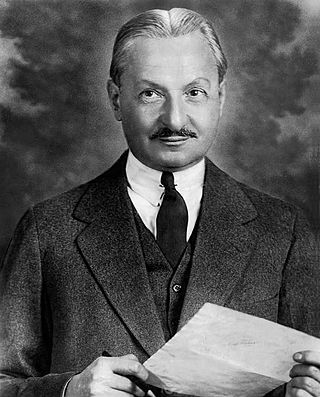
Florenz Edward Ziegfeld Jr. was an American Broadway impresario, notable for his series of theatrical revues, the Ziegfeld Follies (1907–1931), inspired by the Folies Bergère of Paris. He also produced the musical Show Boat. He was known as the "glorifier of the American girl". Ziegfeld is a member of the American Theater Hall of Fame.
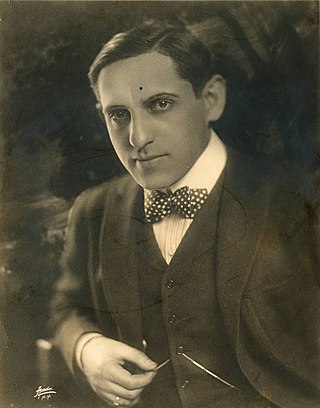
Gustave Edwards was an American composer, songwriter and film director. He also was a vaudevillian, organised his own theatre companies and was a music publisher.

Bert Kalmar was an American songwriter. He was inducted into the Songwriters Hall of Fame in 1970. He was also a screenwriter.
Nathaniel Davis Ayer was an American composer, pianist, singer and actor. He made most of his career composing and performing in England in Edwardian musical comedy and revue. He also contributed songs to Broadway shows, including some of the Ziegfeld Follies.
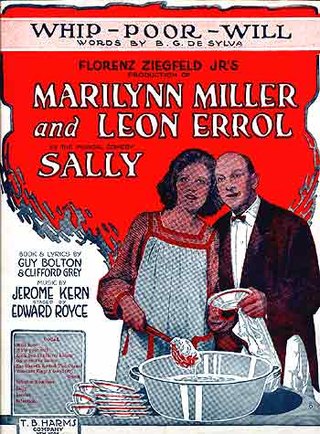
Sally is a musical comedy with music by Jerome Kern, lyrics by Clifford Grey and book by Guy Bolton, with additional lyrics by Buddy De Sylva, Anne Caldwell and P. G. Wodehouse. The plot hinges on a mistaken identity: Sally, a waif, is a dishwasher at the Alley Inn in New York City. She poses as a famous foreign ballerina and rises to fame through joining the Ziegfeld Follies. There is a rags to riches story, a ballet as a centrepiece, and a wedding as a finale. "Look for the Silver Lining" continues to be one of Kern's most familiar songs. The song is lampooned by another song, "Look for a Sky of Blue," in Rick Besoyan's satirical 1959 musical Little Mary Sunshine.

Harry Bache Smith was a writer, lyricist and composer. The most prolific of all American stage writers, he is said to have written over 300 librettos and more than 6000 lyrics. Some of his best-known works were librettos for the composers Victor Herbert and Reginald De Koven. He also wrote the book or lyrics for several versions of the Ziegfeld Follies.

William Denight Cobb was an American lyricist and composer. He and a partner, Ren Shields, produced several popular musicals and musical comedies in the early 20th century. Cobb also had a long-run collaboration with Gus Edwards.
Harry Revel was a British-born American composer, mostly of musical theatre, working with various lyricists, notably Mack Gordon. He is also seen as a pioneer of "space age pop".
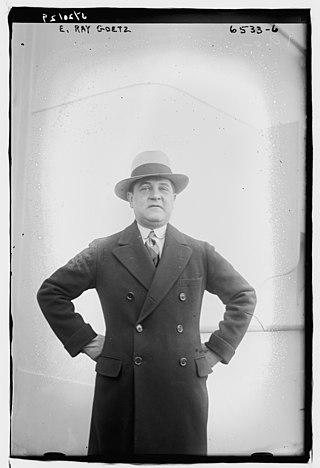
Edward Ray Goetz was an American composer, lyricist, playwright, theatre director, and theatrical producer. A Tin Pan Alley songwriter, he published more than 500 songs during his career, many of them originally written for the New York stage. His songs were recorded by several artists, including Judy Garland, Al Jolson, and Blossom Seeley. He was active as both a lyricist and composer for Broadway musicals from 1906 through to 1930, collaborating with artists like George Gershwin, Cole Porter, Sigmund Romberg, and A. Baldwin Sloane to create material for the theatre.
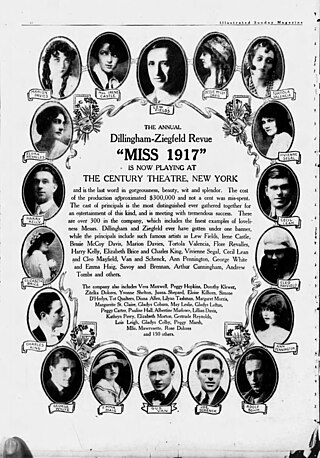
Miss 1917 is a musical revue with a book by Guy Bolton and P. G. Wodehouse, music by Jerome Kern, Victor Herbert and others, and lyrics by Harry B. Smith, Otto Harbach, Henry Blossom and others. Made up of a string of vignettes, the show features songs from such musicals as The Wizard of Oz, Three Twins, Babes in Toyland, Ziegfeld Follies and The Belle of New York.

Vera Michelena was an American actress, contralto prima donna and dancer who appeared in light opera, musical comedy, vaudeville and silent film. She was perhaps best remembered for her starring roles in the musicals The Princess Chic, Flo Flo and The Waltz Dream, her rendition of the vampire dance in the musical Take It from Me and as a Ziegfeld Follies performer.

A Parisian Model is a 1906 Edwardian musical comedy with music by Max Hoffman, Sr. to a book and lyrics by Harry B. Smith. The story concerns a dressmaker's model who comes into a fortune. It opened on Broadway in 1906, ran with success and toured. It was produced by Frank McKee and Florenz Ziegfeld Jr., and starred Anna Held, Ziegfeld's common law wife. Soon after the success of this piece, Ziegfeld would launch his famous series of Ziegfeld Follies revues.
Seymour Furth was an American songwriter, composer, and librettist active from the late 1890s until his death in 1932. He wrote popular songs for Broadway musicals, vaudeville, tin pan alley, and minstrel shows; notably creating the opening musical number for the first Ziegfeld Follies in 1907. He most frequently worked as a composer with another collaborator serving as his lyricist, but sometimes he created both music and lyrics, and at other times just words with other composers. He composed piano works in popular styles of his day, including ragtime. His best known songs were comedic, including "Nothing Like That in Our Family" (1906) and "No Wedding Bells For Me" (1907).
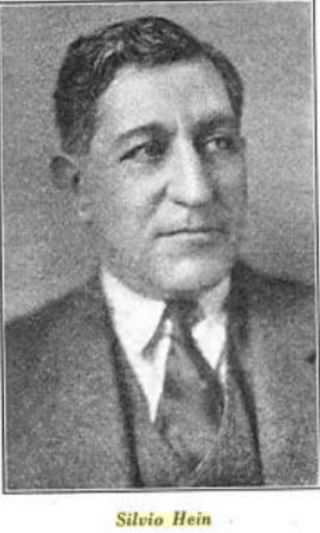
Silvio Hein was an American composer, songwriter, conductor, and theatrical producer. He was a songwriter for Tin Pan Alley and composed the scores to fourteen Broadway musicals. His most successful stage work was the 1917 musical Flo-Flo which he created with the French librettist and playwright Fred de Gresac. His songs were also interpolated into musicals created by others, including The Little Duchess and Ziegfeld Follies. In addition to his work writing music, he also worked as both a conductor and producer on Broadway. In 1914 he was a founding member of the American Society of Composers, Authors and Publishers.














